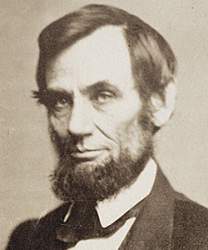Record Data
Source citation
Abraham Lincoln, Farewell Address, three versions, February 11, 1861, in Roy P. Basler, ed., The Collected Works of Abraham Lincoln (8 vols., New Brunswick, NJ: Rutgers University Press, 1953), 4: 191-192, http://quod.lib.umich.edu/l/lincoln/.
Recipient (to)
People of Springfield, Illinois
Type
Speech
Date Certainty
Estimated
Transcriber
Transcription adapted from The Collected Works of Abraham Lincoln (1953), edited by Roy P. Basler
Adapted by Matthew Pinsker, Dickinson College
Transcription date
Transcription
The following text is presented here in complete form, as it originally appeared in print. Spelling and typographical errors have been preserved as in the original.
[A. Version]
February 11, 1861
My friends---No one, not in my situation, can appreciate my feeling of sadness at this parting. To this place, and the kindness of these people, I owe every thing. Here I have lived a quarter of a century, and have passed from a young to an old man. Here my children have been born, and one is buried. I now leave, not knowing when, or whether ever, I may return, with a task before me greater than that which rested upon Washington. Without the assistance of that Divine Being, who ever attended him, I cannot succeed. With that assistance I cannot fail. Trusting in Him, who can go with me, and remain with you and be every where for good, let us confidently hope that all will yet be well. To His care commending you, as I hope in your prayers you will commend me, I bid you an affectionate farewell
[B. Version]
My Friends:
No one not in my position can appreciate the sadness I feel at this parting. To this people I owe all that I am. Here I have lived more than a quarter of a century; here my children were born, and here one of them lies buried. I know not how soon I shall see you again. A duty devolves upon me which is, perhaps, greater than that which has devolved upon any other man since the days of Washington. He never would have succeeded except for the aid of Divine Providence, upon which he at all times relied. I feel that I cannot succeed without the same Divine aid which sustained him, and on the same Almighty Being I place my reliance for support, and I hope you, my friends, will all pray that I may receive that Divine assistance without which I cannot succeed, but with which success is certain. Again I bid you an affectionate farewell.
[C. Version]
Friends,
No one who has never been placed in a like position, can understand my feelings at this hour, nor the oppressive sadness I feel at this parting. For more than a quarter of a century I have lived among you, and during all that time I have received nothing but kindness at your hands. Here I have lived from my youth until now I am an old man. Here the most sacred ties of earth were assumed; here all my children were born; and here one of them lies buried. To you, dear friends, I owe all that I have, all that I am.
All the strange, chequered past seems to crowd now upon my mind. To-day I leave you; I go to assume a task more difficult than that which devolved upon General Washington. Unless the great God who assisted him, shall be with and aid me, I must fail. But if the same omniscient mind, and Almighty arm that directed and protected him, shall guide and support me, I shall not fail, I shall succeed. Let us all pray that the God of our fathers may not forsake us now. To him I commend you all---permit me to ask that with equal security and faith, you all will invoke His wisdom and guidance for me. With these few words I must leave you---for how long I know not. Friends, one and all, I must now bid you an affectionate farewell.


